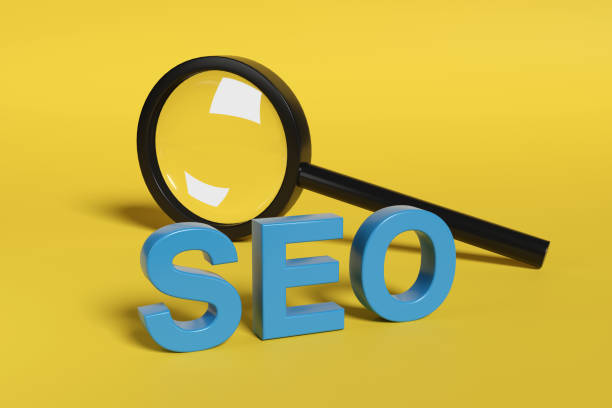Introduction to the World of Digital SEO and Its Importance
In today’s world, where the internet has become an inseparable part of our lives, an online presence is vital for every business and individual.
But merely having an online presence isn’t enough; you need to be seen.
This is where the concept of Search Engine Optimization (SEO) comes in.
#SEO is more than just a keyword or a set of tricks; it’s a comprehensive strategy aimed at improving your website’s ranking in search engine results, such as Google.
When a user searches for a term, search engines display thousands or even millions of results, and most users only look at the first page of these results.
Therefore, ranking at the top means #increasing visitors and consequently #increasing potential customers.
The importance of SEO is not limited to visibility; this process significantly helps improve user experience, enhance brand credibility, and achieve digital marketing goals.
In fact, every online business desperately needs #SEO to guarantee its success.
In the remainder of this article, we will explore various aspects of this field in an explanatory and step-by-step manner.
Don’t have a corporate website yet and missing out on online opportunities? With professional corporate website design by Rasawweb,
✅ Double your business credibility
✅ Attract new customers
⚡ Free consultation for your corporate website!
How Search Engines Work and the Role of Efficient SEO Principles
To optimize our website, we first need to understand how search engines work.
Essentially, search engines have three main processes: Crawling, Indexing, and Ranking.
Search engine bots or “crawlers” constantly roam the internet to discover new or updated web pages; this process is called crawling.
After crawling, information about these pages is transferred to a vast database and organized; this stage is indexing.
Finally, when a user searches for a keyword, the search engine displays the most relevant and highest-quality results from its indexed pages based on its complex algorithms; this stage is ranking.
The role of efficient SEO principles becomes prominent here; by adhering to these principles, we help search engines better understand our content, index it correctly, and ultimately rank it as an authoritative and relevant source for specific keywords.
This process includes optimizing site structure, using appropriate keywords, and creating high-quality content that sends positive signals to search engines.
Understanding these mechanisms is the first step on the path to successful SEO.
Website SEO Architecture and On-Page Techniques
Website SEO architecture and On-Page SEO techniques are among the most important optimization aspects that are fully within our control.
These techniques include all actions we can take within our website to improve its ranking in search results.
Key on-page elements include optimizing the Title Tag, Meta Description, appropriate use of headings (H1, H2, H3), Image Alt Text optimization, URL structure, and internal linking.
Furthermore, the quality and relevance of content are of high importance.
High-quality content should address user needs, provide comprehensive information, and be grammatically and stylistically correct.
Here is a table of key on-page SEO elements:
| On-Page Element | SEO Importance | Key Notes |
|---|---|---|
| Title Tag | Very High | Must contain the main keyword and be less than 60 characters. |
| Meta Description | Medium (for click attraction) | An engaging summary containing keywords, approximately 150-160 characters. |
| Heading Tags (H1-H6) | High | Content structuring and logical use of keywords. |
| Page Content | Very High | Comprehensive, high-quality, unique, and relevant to user needs. |
| Images | Medium | Size optimization, proper Alt Text usage, and precise description. |
| Internal Links | High | Increasing internal page authority and aiding search engine crawling. |
Paying attention to these details helps search engines better understand your content and find it more relevant to user searches.
This part of SEO requires a specialized approach and precision in implementation.
Advanced SEO Solutions and Off-Page Strategies
Unlike on-page techniques which are directly under your control, Off-Page SEO strategies involve activities performed outside your website that help increase its authority and ranking.
The most important and impactful component of this section is Link Building.
Inbound links or Backlinks from other reputable websites to your site are considered a “vote of confidence” from others and are one of the strongest ranking signals for search engines.
However, the quality of links is more important than their quantity; a backlink from a website with high domain authority and relevance to your field of activity is far more valuable than dozens of links from low-quality websites.
Click here to preview your posts with PRO themes ››
In addition to link building, other factors such as social media activity, influencer marketing, and listings in reputable directories can indirectly influence off-page SEO.
For example, sharing your content on social media can lead to increased brand awareness and ultimately attract natural links.
This part of SEO requires a precise guidance strategy and long-term planning, as acquiring high-quality links is time-consuming and requires producing valuable content and active engagement with the online community.
In fact, a comprehensive SEO approach would be incomplete without considering these external factors.
Does your company’s website create a professional and lasting first impression in the minds of potential customers? Rasawweb, with professional corporate website design, not only represents your brand’s credibility but also opens a path for your business growth.
✅ Create a powerful and reliable brand image
✅ Attract target customers and increase sales
⚡ Get free consultation
Technical SEO Aspects and Their Impact on Site Performance
Technical SEO aspects refer to optimizing website infrastructure to help search engines crawl and index more efficiently.
This section includes elements that directly impact user experience and the accessibility of your content for search engines.
Website loading speed is one of the most crucial factors; a fast-loading site not only provides a better user experience but also has a higher chance of ranking well.
Responsive Design for mobile is also a necessity today, as a significant portion of searches occur via mobile devices.
Other technical aspects include:
* Optimized URL structure: URLs that are readable and include keywords.
* XML Sitemap: A file that helps search engines discover all important pages of your site.
* Robots.txt file: A file that tells search engines which parts of the site to crawl and which to ignore.
* Broken links and redirects: Identifying and fixing broken links and correctly using 301 redirects for deleted or moved pages.
* Structured Data or Schema Markup: Codes that help search engines better understand your content and display it in a richer way in results.
This section of SEO requires specialized technical knowledge and can significantly impact your site’s crawlability and ranking.
Improving technical performance is the foundation of a powerful SEO strategy.
The Importance of Keyword Research and Creating Engaging Content
Keyword research is the cornerstone of any successful SEO strategy.
This process involves finding the words and phrases your target users enter into search engines.
The main goal is to identify keywords with high search volume and reasonable competition that have the greatest potential to attract relevant traffic to your website.
Tools such as Google Keyword Planner, Ahrefs, Semrush, and Moz Keyword Explorer can assist you in this phase.
But merely finding keywords isn’t enough; you need to understand what intent (Search Intent) users have when searching for those keywords.
After keyword research, it’s time for content creation.
Engaging content, or practical and appealing content, should not only incorporate target keywords but also answer users’ questions, solve their problems, and provide educational and valuable information.
This content can be in the form of articles, blog posts, infographics, videos, and podcasts.
Content that encourages users to share and interact plays a significant role in attracting natural backlinks and increasing site authority.
Good content naturally earns links and is seen more by search engines.
Remember that the ultimate goal of content creation is not just to rank in search engines, but to serve the user and create lasting value.
The power of content SEO lies in attracting loyal audiences and increasing your website’s authority.
Data Analysis and Measuring SEO Performance with an Analytical Approach
After implementing SEO strategies, the most important next step is data analysis and performance measurement.
Without continuous monitoring, we cannot understand which strategies have been effective and which need optimization.
Tools such as Google Analytics and Google Search Console are vital tools for this purpose.
Google Search Console provides information about how your site appears in search results, the keywords you rank for, technical issues, and backlinks.
Google Analytics also provides data on site traffic, user behavior, Bounce Rate, time spent on site, and Conversion Paths.
Click here to preview your posts with PRO themes ››
Here is a table of key SEO metrics and how to analyze them:
| Key SEO Metric | Importance | How to Analyze |
|---|---|---|
| Organic Traffic | Very High | Continuous increase indicates strategy success. |
| Keyword Ranking | High | Monitoring the position of main keywords and improving them. |
| Click-Through Rate (CTR) | High | Ratio of clicks to impressions in search results, optimizing title and meta descriptions. |
| Bounce Rate | Medium | Percentage of users who leave after viewing one page; indicates irrelevant content or poor user experience. |
| Time on Page | High | The duration users spend on a page; indicates content attractiveness and usefulness. |
| Backlinks | Very High | Number and quality of new and lost backlinks. |
With an analytical approach, you can identify the strengths and weaknesses of your SEO strategy and make data-driven decisions for its improvement.
This is a continuous cycle of improvement, achieved by monitoring SEO success metrics.
New Trends in the World of SEO and Its Future
The world of SEO is constantly changing and evolving, and with every update to search engine algorithms, we observe new trends.
In recent years, several new trends have emerged that are essential for every SEO professional to be aware of.
Voice Search is one of these important trends; with the increasing use of voice assistants like Siri, Google Assistant, and Alexa, optimizing for conversational and longer queries has gained more importance.
Artificial intelligence and machine learning also play an increasing role in Google’s algorithms, enabling search engines to better understand user intent and provide more relevant results.
User Experience (UX) has also gained increasing attention.
Google has clearly stated that Core Web Vitals (a set of metrics related to speed, interactivity, and visual stability) are important ranking factors.
Local SEO has become crucial for physical businesses looking to attract local customers.
Additionally, video content and podcasts, due to their increasing popularity, have created new opportunities for SEO and visibility.
To stay ahead in this competitive landscape, you must continuously keep up with news and changes and update your strategies accordingly.
Understanding these changes will help you maintain successful website SEO in the long run.
Don’t have a corporate website yet and missing out on online opportunities? With professional corporate website design by Rasawweb,
✅ Double your business credibility
✅ Attract new customers
⚡ Free consultation for your corporate website!
Common SEO Mistakes and Guidance to Avoid Them
On the path to search engine optimization, many individuals and businesses make mistakes that can nullify their efforts or even harm their site’s ranking.
Awareness of these mistakes and avoiding them is an important part of education in the field of SEO.
One of the most common mistakes is excessive use of keywords (Keyword Stuffing).
Excessive repetition of keywords is not only annoying for users but is also identified by search engines as a spam technique and can lead to site penalties.
Duplicate or Thin Content is also a major error; search engines prefer unique and valuable content.
Other common mistakes include:
* Ignoring User Experience (UX): If your site is slow, difficult to navigate, or not optimized for mobile, users will quickly leave it.
* Neglecting internal and external link building: Many websites underestimate the importance of a good internal link structure and acquiring quality backlinks.
* Failure to regularly update content: Old and outdated content reduces site authority.
* Ignoring technical SEO: Issues related to site speed, sitemap, and robots.txt file can prevent proper site crawling and indexing.
By receiving appropriate guidance and conducting regular SEO audits, you can avoid falling into these pitfalls and pave your way to success in fundamental SEO principles.
SEO: A Continuous Process and Achieving the Key to SEO Success
One of the most important lessons in the field of SEO is that it’s not a one-time activity but rather a continuous and evolutionary effort.
Search engine algorithms are constantly changing and updating; competitors also don’t sit idle and are continually optimizing their websites.
Therefore, to maintain and improve your ranking in search results, it’s essential to regularly review your SEO strategy, produce new content, acquire quality backlinks, and assess your site’s technical performance.
Click here to preview your posts with PRO themes ››
To achieve the key to SEO success, you must have a long-term perspective.
SEO results are often not immediately visible and may take months for implemented changes to show their impact.
Patience, continuous data analysis, and readiness to adapt to changes are essential qualities for success in this field.
SEO is an investment; an investment in online visibility, attracting new customers, and building a strong brand in the digital space.
By persisting in your efforts, utilizing specialized knowledge, and producing engaging and useful content, you can achieve your SEO goals and gain a prominent position among your competitors.
This continuous journey will guide you toward the pinnacle of success in online searches.
Frequently Asked Questions
| Question | Answer |
|---|---|
| What is SEO? | SEO, or Search Engine Optimization, is the process of increasing the quality and quantity of website traffic by improving the site’s ranking in natural (organic) search engine results like Google. |
| What are the main types of SEO? | SEO is divided into three main categories: On-Page SEO, Off-Page SEO, and Technical SEO. |
| What does On-Page SEO include? | On-Page SEO involves optimizing elements within the website, such as keywords, Title Tag, Meta Description, content, URL structure, images, and internal links. |
| What is Off-Page SEO? | Off-Page SEO refers to activities outside the website that help improve its ranking, such as Backlink Building, social media marketing, and Brand Mentions. |
| What is Technical SEO? | Technical SEO focuses on optimizing the technical aspects of a website to help search engines crawl and index it better. This includes site speed, mobile-friendliness, site structure, Sitemaps, and the Robots.txt file. |
| What role do Keywords play in SEO? | Keywords are the terms users enter into search engines. Proper and targeted use of relevant keywords in content and site elements helps search engines understand your page’s topic and display it for relevant searches. |
| What is a Backlink and why is it important? | A backlink, or inbound link, is a link from one website to another. Backlinks act as a “vote of confidence” from other sites for search engines and play an important role in a site’s authority and ranking, especially if they come from reputable sites. |
| What effect does quality content have on SEO? | Quality content that is relevant, comprehensive, and unique not only attracts and retains users but also shows search engines that your page is valuable. This helps improve rankings, reduce Bounce Rate, and increase user time on site. |
| Why is site loading speed important for SEO? | Site loading speed is an important ranking factor for Google. Faster sites provide a better user experience, have lower bounce rates, and are preferred by search engines. |
| Is SEO a one-time process? | No, SEO is a continuous and long-term process. Search engine algorithms are constantly changing, competition is increasing, and site content needs regular updates. Therefore, SEO requires continuous monitoring, analysis, and optimization. |
And other services of Rasa Web Advertising Agency in the field of advertising
Smart SEO: A combination of creativity and technology to increase website traffic through Google Ads management.
Smart Content Strategy: A creative platform for improving digital branding using real data.
Smart Sales Automation: A fast and efficient solution for analyzing customer behavior with a focus on precise audience targeting.
Smart Advertorial: A dedicated service for online growth based on attractive UI design.
Smart Advertorial: A professional solution for increasing sales with a focus on precise audience targeting.
And over hundreds of other services in the field of internet advertising, advertising consultation, and organizational solutions
Internet Advertising | Advertising Strategy | Advertorial
Resources
What is SEO? Complete GuideComprehensive SEO Guide on ZoomitKey SEO Tips for Digital MarketingThe Importance of SEO in Business Success
? For your business to thrive in the digital world, Rasawweb Digital Marketing Agency is your smart companion. With us, you will have a complete experience of professional services, from modern UI website design to comprehensive SEO and content marketing strategies.
📍 Tehran, Mirdamad Street, Next to Central Bank, Southern Kazeroun Alley, Ramin Alley, No. 6














